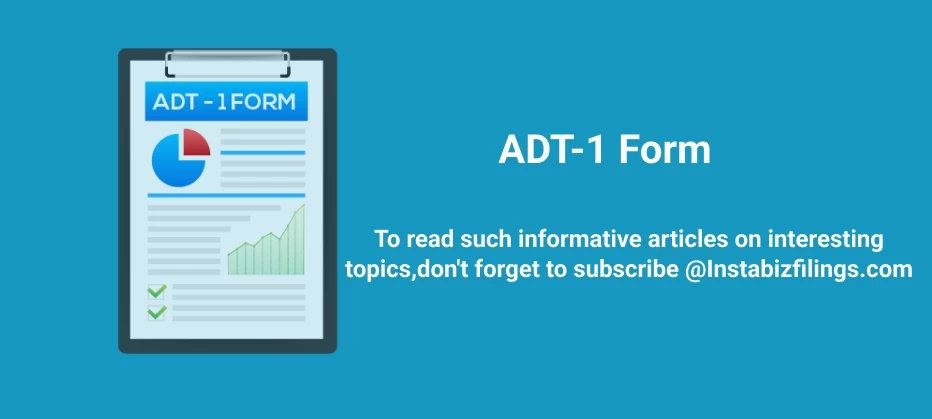
ADT-1 Form
February 20, 2025 by Team Instabizfilings
The ADT-1 form is a crucial filing for Indian companies, specifically related to the appointment of auditors. It is required to be filed with the Ministry of Corporate Affairs (MCA) after the first auditor of the company has been appointed. Let's explore in detail the filing deadlines, late penalties, and other important details related to ADT-1.
What is ADT-1?
ADT-1 is a form that must be filed with the Ministry of Corporate Affairs (MCA) whenever an auditor is appointed for the first time by a company. The form ensures that the company's appointment of an auditor is officially recognized and documented in compliance with the requirements set out by the Companies Act of 2013.
Due Date for Filing ADT-1
The due date for filing the ADT-1 form depends on the date of the first appointment of the auditor. According to the Companies Act, ADT-1 must be filed within 15 days from the date of the appointment of the first auditor in the company.
For example, if the first auditor is appointed during the company's first Annual General Meeting (AGM), the ADT-1 form should be filed within 15 days from the date of that meeting.
Key Points About ADT-1 Filing
-
The form must be filed in e-Form ADT-1 on the MCA portal.
-
The company is required to appoint its first auditor at its first AGM and file ADT-1 to communicate this appointment to the Ministry of Corporate Affairs.
-
The filing process involves providing details like the name of the auditor, their membership number, and their appointment date.
Late Filing Fees and Penalties for ADT-1
If a company misses the deadline for filing ADT-1, there are penalties and late filing fees involved. The penalty varies depending on how long after the due date the form is filed. These penalties are imposed to ensure that the filing requirements are adhered to and the auditor's appointment is officially recognized.
-
Late Filing Fee:
- If the form is filed after the due date, a late filing fee will be levied based on the number of days it is delayed.
- ADT-1 forms must be submitted before facing fees amounting to Rs. 100 per calendar day until completion of the filing process.
- The late filing fee is calculated from the day after the due date until the date the form is successfully filed.
-
Penalty for Late Filing:
- The amount of late filing penalty increases when a company takes too long to submit its reports. The penalties for non-compliance in severe cases will likely require financial payments by the company along with its officers.
- Extended or frequent delays in filing may trigger more severe penalties such as fines as well as legal consequences which fall under the Companies Act.
Filing ADT-1 for First Auditor
When a company is registering its first auditor, it’s important to ensure that the appointment process follows all legal protocols:
-
The Board of Directors must choose the first auditor of a company within thirty days starting from its incorporation date. The Board needs to formalize auditor appointments through minutes of their meetings.
-
After the appointment of the first auditor, the company must file ADT-1 within 15 days from the date of the appointment. This serves as an official record of the appointment with the Ministry of Corporate Affairs (MCA).
Consequences of Not Filing ADT-1
Undue delays in filing ADT-1 or non-filing of this notification results in various adverse effects for the organization.
-
Companies should expect penalties due to their noncompliance with statutory requirements connected to auditor appointment notifications and notifications.
-
The company along with its directors faces potential legal repercussions when non-filing occurs or when filing occurs late more than once. Late or non-filing of ADT-1 can damage the reputation of the company.
Filing ADT-1 for Subsequent Auditor Appointments
While ADT-1 is primarily used for the appointment of the first auditor, it is also used for notifying the MCA when a new auditor is appointed or re-appointed for subsequent terms (after the first auditor's term ends).
In such cases, the form must be filed within 15 days of the appointment of the new auditor.
Conclusion
Your company’s transparency together with regulatory compliance depends on timeliness when you file the ADT-1 report. A company has exactly 15 days from when it appoints its first auditor to file ADT-1. Beyond the legal deadlines ADT-1 submission faces substantial penalty risks because of late filing which makes timely submission essential.
Your organization needs to satisfy the legal obligation of auditor appointment by having a system to monitor filing deadlines.
Disclaimer
The information provided in this blog is purely for general informational purposes only. While every effort has been made to ensure the accuracy, reliability and completeness of the content presented, we make no representations or warranties of any kind, express or implied, for the same.
We expressly disclaim any and all liability for any loss, damage or injury arising from or in connection with the use of or reliance on this information. This includes, but is not limited to, any direct, indirect, incidental, consequential or punitive damage.
Further, we reserve the right to make changes to the content at any time without prior notice. For specific advice tailored to your situation, we request you to get in touch with us.

Need more details? We can help! Talk to our experts now!
Start Your Business Registration – Talk to Our Experts Now!

Still Confused?
Talk to experts? Fill in the information and we will reach out in 24 Working Hours.

